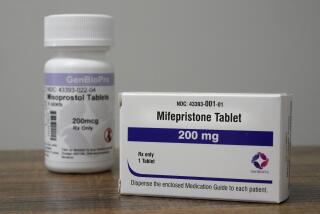Artificial Insemination Data Raises Fears
- Share via
WASHINGTON — More than 172,000 women resorted to artificial insemination last year to try to become pregnant, a research arm of Congress reported Tuesday in a new study that raises concerns about the potential transmission of infectious and hereditary diseases through the practice.
The findings by the Congressional Office of Technology Assessment indicate that artificial insemination is far more widespread than experts had thought. The study found that only about half the doctors performing the procedure test in advance for the AIDS virus, which could be passed along to the mother or child, or for genetic disorders that could afflict the baby.
Releasing the report that gives the most comprehensive evaluation to date of artificial insemination, Sen. Albert Gore Jr. (D-Tenn.) said it “paints a disturbing picture of the problems that continue to plague a miraculous biomedical technology.”
Sees Need for Oversight
Gore, vice chairman of a congressional advisory panel on biotechnology, called for stepped-up federal oversight of the practice, in which semen from a donor is placed in the womb to fertilize ova. He said the practice has been largely overlooked by public policy makers in the ethical debate over how medical technology can help the nation’s 2.5-million infertile couples.
But professionals in the insemination field, while praising the study for its thoroughness and acknowledging room for better safeguards, warned against exaggerating the findings.
They underscored that the researchers’ reported no substantiated cases of AIDS infection through artificial insemination in this country and that the procedure poses fewer risks of transmitting birth defects than traditional conception.
“There are dangers, and I think this (report) helps to define them, but we can’t go blowing the problem out of proportion,” said Dr. William Schlaff, director of the insemination program at Johns Hopkins University in Baltimore.
1,500 Questionnaires
The study was based in part on more than 1,500 questionnaires filled out by physicians.
It said that many commercial sperm banks, which match a woman with a choice of anonymous donors and then give the semen to her doctor to perform the procedure, do an adequate job of screening for the AIDS virus and of freezing and quarantining sperm samples to ensure safety.
However, the researchers said some physicians who carry out the entire process themselves do not do enough to check for infection or genetic disorders.
The study said that of the 172,000 women who sought artificial insemination last year, about 90,000 used their husband’s semen. The average cost of the procedure was $953.
About 65,000 babies were born through artificial insemination last year, the report said. In the past, experts had estimated the total at only 20% to 33% of that number.
Wants Screening Required
Gore said he believes the government should consider regulations requiring screening for infectious diseases and other disorders.
An official of the Food and Drug Administration who requested anonymity acknowledged “a perceived problem . . . that is of concern to us.” He said the agency is now looking at whether it should implement regulations. In February, the FDA set voluntary testing guidelines for doctors to use.






